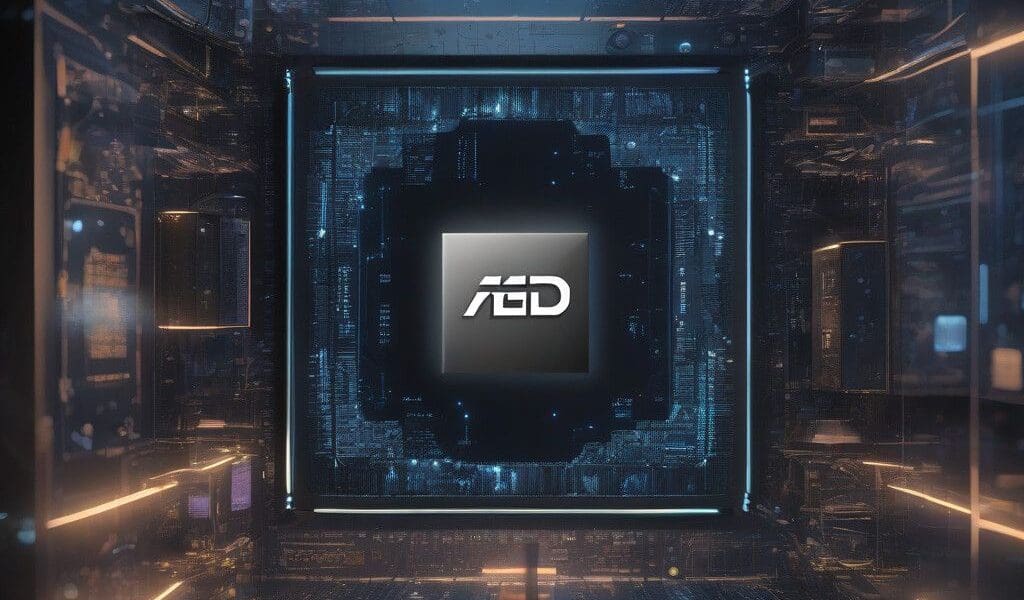AMD's Next-Gen AI Chip Plans: A Bold Move in a Competitive Landscape
Advanced Micro Devices (AMD) is gearing up to mass-produce its newest AI chip, the MI325X, by the end of 2024. This initiative marks a significant step for AMD, as it seeks to expand its market share in the AI sector, which has been rapidly evolving under the dominance of Nvidia. Despite the promising trajectory of AMD’s new chip, the company’s stock dipped by nearly 5% following the announcement, a testament to the high expectations surrounding potential client acquisitions and the competitive pressures in the tech industry.
The MI325X is designed to enhance AI processing capabilities, leveraging advanced memory technologies to accelerate computing speed. AMD plans to release this chip to the market in early 2025, demonstrating the company’s commitment to remaining at the forefront of AI technology. Moreover, the subsequent MI350 series is scheduled for a 2025 release, promising improved architecture and an increase in memory capacity, further positioning AMD as a viable alternative in a field where Nvidia currently holds a substantial lead.
This timing is crucial. As demand for AI processors continues to surge, bolstered by the rising prominence of generative AI applications, AMD is intensifying its efforts to capture a share of this burgeoning market. The company’s CEO, Lisa Su, indicated that Nvidia has set a high benchmark, but AMD’s innovations could potentially shift the dynamics in this highly competitive arena. Notably, AMD will continue collaborating with Taiwan Semiconductor Manufacturing Company (TSMC) for its chip production, which underscores the strategic partnerships essential for technological advancement.
AMD critics have noted that the absence of new major cloud-computing clients during the announcement could signify challenges ahead. Although the AI chip sector is thriving, competition remains fierce, particularly with Nvidia, whose stock appreciated in the wake of AMD’s latest updates. This contrast emphasizes the growing pressure on AMD to not only deliver high-performance products but also to secure substantial client engagements to validate its strategy.
In addition to the MI325X, AMD has introduced server and PC processors based on its Zen 5 architecture, which promise faster processing speeds and optimized AI capabilities. The integration of AI capabilities into various computing applications can enhance performance and efficiency across multiple sectors, ranging from data analysis to machine learning workflows. By bolstering its product portfolio with the latest technologies, AMD is signaling its determination to challenge the current market leader.
The AI chip market is characterized by rapid advancements and shifting consumer expectations. As companies increasingly rely on artificial intelligence to innovate and improve functionality, AMD’s new chips could find a receptive audience. The ongoing evolution of AI requires not just hardware improvements but also software compatibility and client support. Thus, AMD must ensure that its upcoming chip offerings are versatile and compatible with prevalent AI frameworks used across industries.
Moreover, demand for AI processors remains vigorous. Market analysts project significant growth in artificial intelligence applications across sectors such as healthcare, finance, and manufacturing. By aligning itself with these trends, AMD can capitalize on emerging opportunities to establish a stronger foothold in the AI ecosystem.
As we observe AMD’s journey into the AI market, the interplay between innovation and market dynamics offers valuable lessons in strategic positioning amid competition. For industry professionals and businesses alike, AMD’s experience serves as a case study on the importance of product development, market responsiveness, and the role of partnerships in technology advancement.
In conclusion, while AMD’s recent announcements reflect a promising trajectory into AI chip production, the path forward is laden with competitive challenges. The company’s sustained success will depend on its ability to attract new clients, deliver high-quality products, and maintain a robust R&D pipeline. As the AI landscape continues to shift, AMD’s strategic decisions will play a pivotal role in determining its market presence against formidable rivals.








